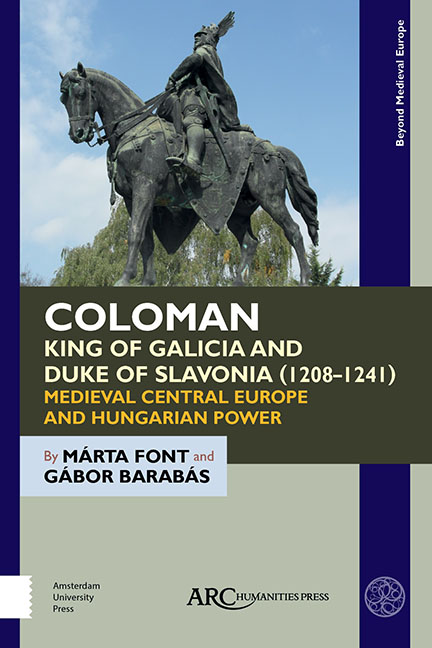 Coloman, King of Galicia and Duke of Slavonia (1208–1241)
Coloman, King of Galicia and Duke of Slavonia (1208–1241) Book contents
- Frontmatter
- Contents
- List of Illustrations
- Foreword
- Introduction
- PART ONE COLOMAN AS CHILD RULER OF GALICIA
- Chapter 1 The Galician Context in 1205
- Chapter 2 The Agreement of Scepus
- Chapter 3 Coloman’s Coronation as King of Galicia: Date and Place
- Chapter 4 The Hungarian Elite and Coloman’s Court
- Chapter 5 Coloman’s Position in Halych, 1215–22: Campaigns and Opponents
- Chapter 6 Upholding the Galician Claim: Coloman’s Place in Hungary
- PART TWO COLOMAN, DUKE OF WHOLE SLAVONIA (1226–1241)
- Chapter 7 Coloman and Scepus, Before 1226
- Chapter 8 Coloman as Duke of Whole Slavonia from 1226
- Chapter 9 Coloman’s Status and the Inner Workings of the Duchy
- Chapter 10 Coloman’s Ecclesiastical and Secular Actitivities in Slavonia
- Chapter 11 Coloman’s Rule in Slavonia
- Chapter 12 Politics and Dynastic Affairs
- Chapter 13 Challenges in the Balkans
- Chapter 14 The Mongol Attack and Coloman’s Death
- Conclusion: Coloman in the Eyes of Posterity
- Bibliography
- Index
Chapter 12 - Politics and Dynastic Affairs
Published online by Cambridge University Press: 20 November 2020
- Frontmatter
- Contents
- List of Illustrations
- Foreword
- Introduction
- PART ONE COLOMAN AS CHILD RULER OF GALICIA
- Chapter 1 The Galician Context in 1205
- Chapter 2 The Agreement of Scepus
- Chapter 3 Coloman’s Coronation as King of Galicia: Date and Place
- Chapter 4 The Hungarian Elite and Coloman’s Court
- Chapter 5 Coloman’s Position in Halych, 1215–22: Campaigns and Opponents
- Chapter 6 Upholding the Galician Claim: Coloman’s Place in Hungary
- PART TWO COLOMAN, DUKE OF WHOLE SLAVONIA (1226–1241)
- Chapter 7 Coloman and Scepus, Before 1226
- Chapter 8 Coloman as Duke of Whole Slavonia from 1226
- Chapter 9 Coloman’s Status and the Inner Workings of the Duchy
- Chapter 10 Coloman’s Ecclesiastical and Secular Actitivities in Slavonia
- Chapter 11 Coloman’s Rule in Slavonia
- Chapter 12 Politics and Dynastic Affairs
- Chapter 13 Challenges in the Balkans
- Chapter 14 The Mongol Attack and Coloman’s Death
- Conclusion: Coloman in the Eyes of Posterity
- Bibliography
- Index
Summary
BÉLA WAS ABLE to occupy the Hungarian throne after his father, Andrew II, died, as no one challenged him. This state of affairs was unique in the history of the Árpád family, since any living relative, especially a brother, meant almost every time a threat to the rightful heir, as happened between Béla's and Coloman's father and his older brother, King Emeric. On this occasion, the duke of Slavonia did not challenge his brother's claim and even actively supported the new king in many ways. This assertion is not made simply through the lack of countervailing evidence but in the circumstances of Béla's enthronement.
Let us first consider the background of the coronation, since it is assumed that Coloman's wife, Salomea, had a role in the preparations of the ceremony. According to the narrative in the Fourteenth Century Chronicle-Composition (particularly the text of the Hungarian Illuminated Chronicle / Chronicon Pictum), Prince Daniil also took part in the enthronement ceremony. Hollý suspects that the ruler from the Rus’ intended to approach the Hungarian royal family after the death of his rival, Prince Andrew, who was epresentative of the Hungarian claims in Galicia. It is perhaps not inconceivable that Daniil turned to Salomea's mother, the widow of Leszek the White, and therefore the mother-in-law of Coloman, who was of Rus’ian origin herself. Maybe the duchess of Sandomierz made use of her family ties and mediated between Daniil and Coloman, and finally King Béla IV. Whatever the background, the Galician duke was present at the coronation; he even had a role in the ceremony. According to the Illuminated Chronicle, Coloman held his brother's sword, whilst Daniil led the new ruler's horse, in which act he symbolically acknowledged Béla's superior status and also placed himself below Coloman hierarchically in this quasi-feudal custom. Daniil's intention was probably to secure himself Hungarian support. It is remarkable to see the Hungarian king, the prince with the royal title connected to Galicia, and the de facto Galician ruler all three cooperating, which implies prior mediation, whether or not Grzymisława or Salomea were involved or not.
- Type
- Chapter
- Information
- Coloman, King of Galicia and Duke of Slavonia (1208–1241)Medieval Central Europe and Hungarian Power, pp. 105 - 114Publisher: Amsterdam University PressPrint publication year: 2019


